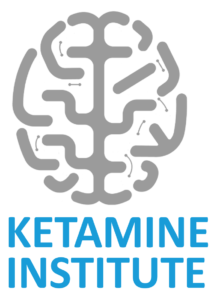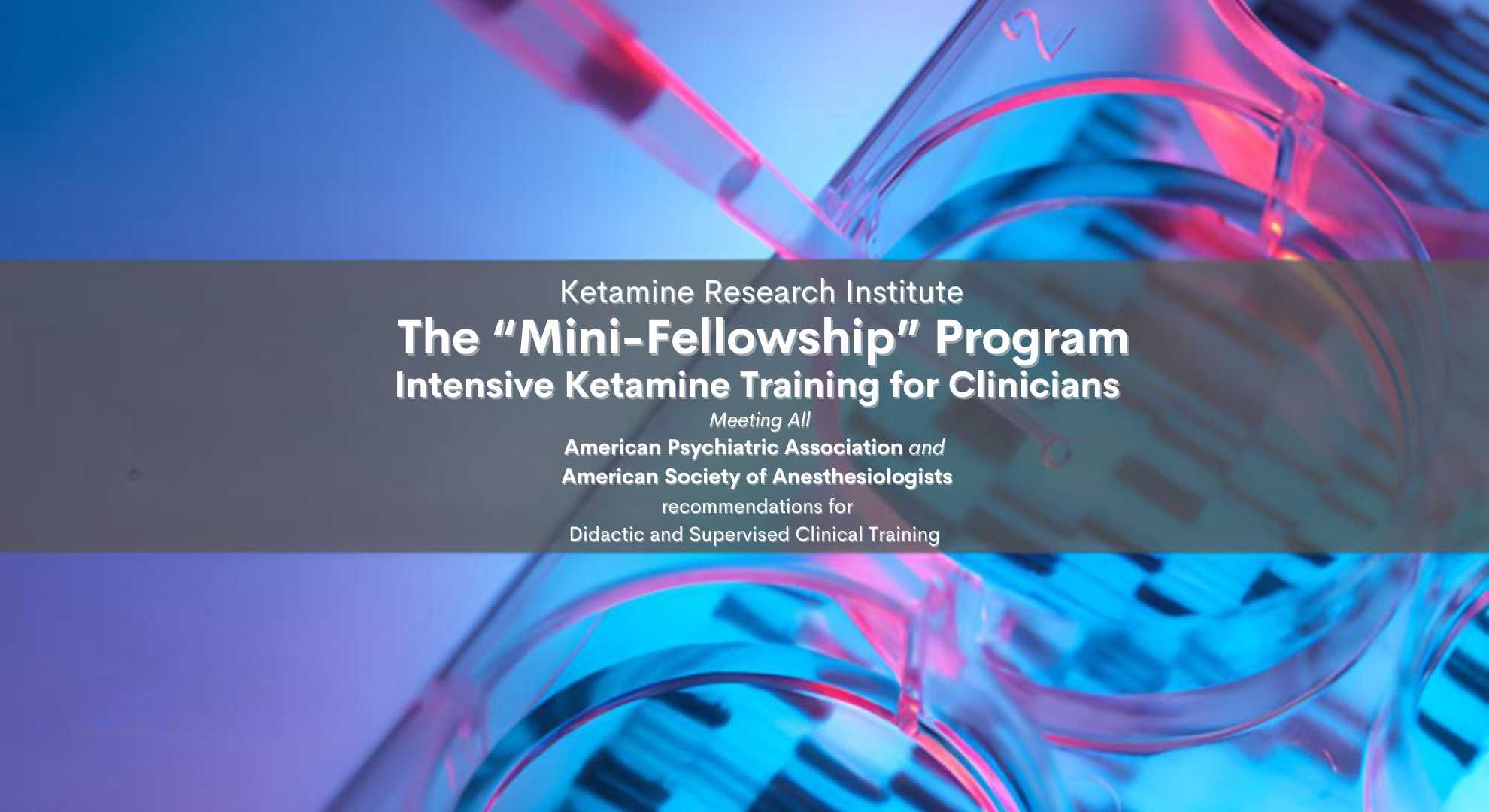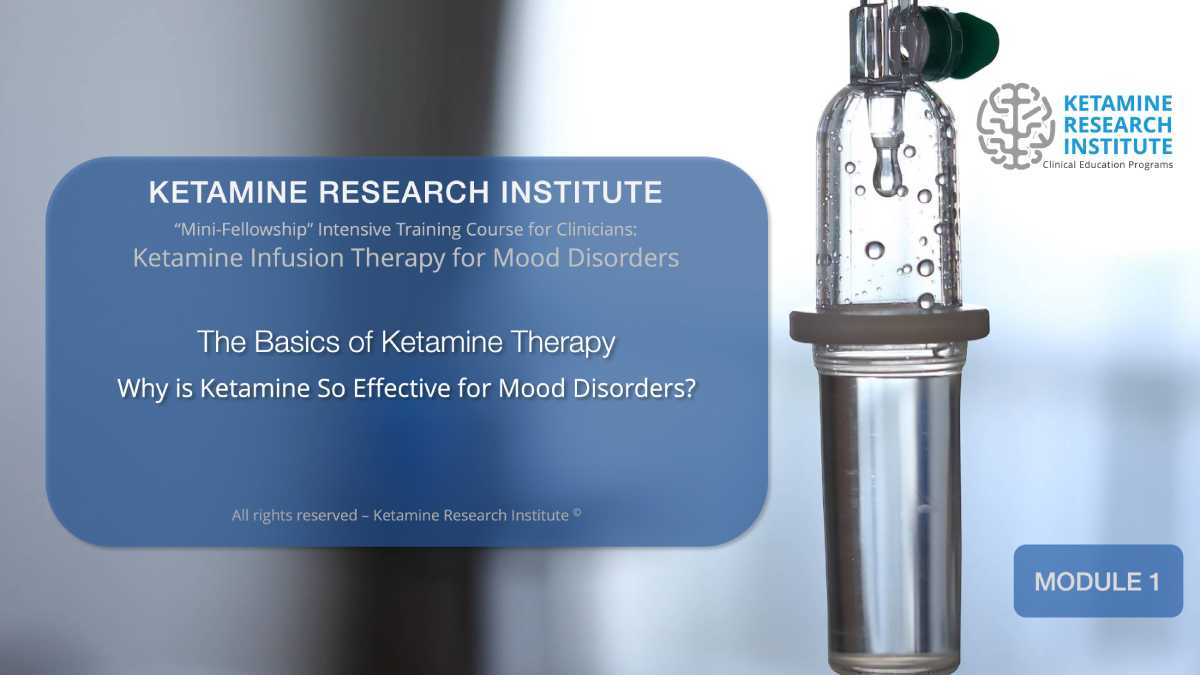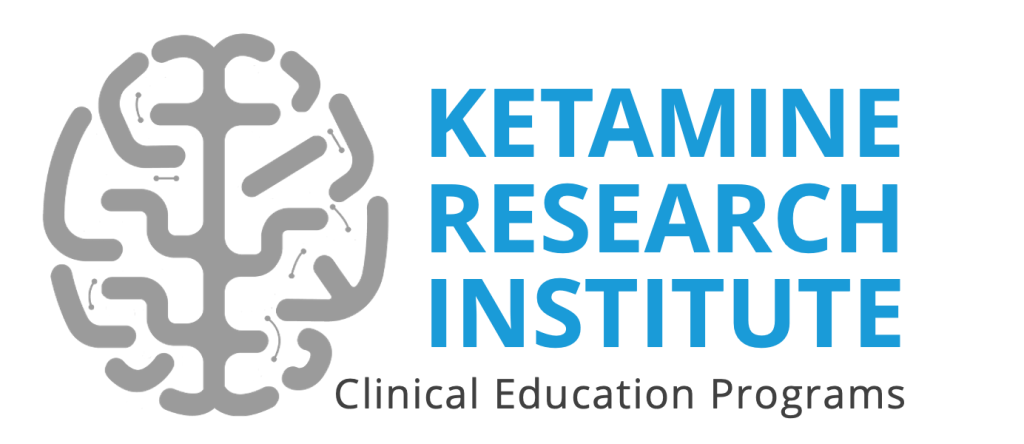
Ketamine Research Institute Training Program
Welcome to day 1 of training!
Essential Foundations in Ketamine Therapy
Day 1 Overview: Essential Foundations for Ketamine Therapy
Modules 1 and 2: Building a Strong Base
Day 1 of our 3-day ketamine training course equips clinicians with the essential knowledge and tools to administer ketamine therapy confidently. This day lays the groundwork for understanding ketamine's effectiveness and navigating the regulations that ensure safe and compliant practice.
Module 1 – The Basics of Ketamine Therapy
We start with the fundamentals, exploring the breakthrough research by Dr. Zarate and the reasons why ketamine is a game-changer in treating mood disorders. Clinicians will gain a deep understanding of ketamine's history, its dual mechanisms in bridging brain chemistry and psychological health, and how it has evolved into today's standard protocols. This module also addresses critical safety concerns, offering insights into managing potential abuse and side effects, making it clear why understanding these basics is vital for any clinician.
Inside Module 1:
The Best Place to Start is at the Beginning
• Zarate's Pioneering Effort: Ketamine for Treatment-Resistant Depression
Why is Ketamine So Effective for Mood Disorders?
• The Secret Behind Ketamine's Success: A Multifaceted Approach to Mood Disorders
• Ketamine's Dual Mechanism: Bridging Brain Chemistry and Psychological Well-being
Understanding the History of the Ketamine Infusion
• The Story of Ketamine Therapy: A Historical Deep Dive
• Milestones in Ketamine's History: The Research That Shaped Modern Therapy
Questions Arise About Ketamine as a Therapeutic Modality
• Ketamine in Focus: Tackling the Tough Questions
• The Complexities of Ketamine Therapy: Administration, Durability, and Dosage
• Building a New Paradigm: The Rise of the Standard Ketamine Protocol
Ketamine Safety, Abuse, and Adverse Effect Issues
• The Safety Spectrum: Addressing Ketamine's Potential for Abuse and Side Effects
• Standardizing Ketamine Use: Ensuring Safe and Effective Treatment
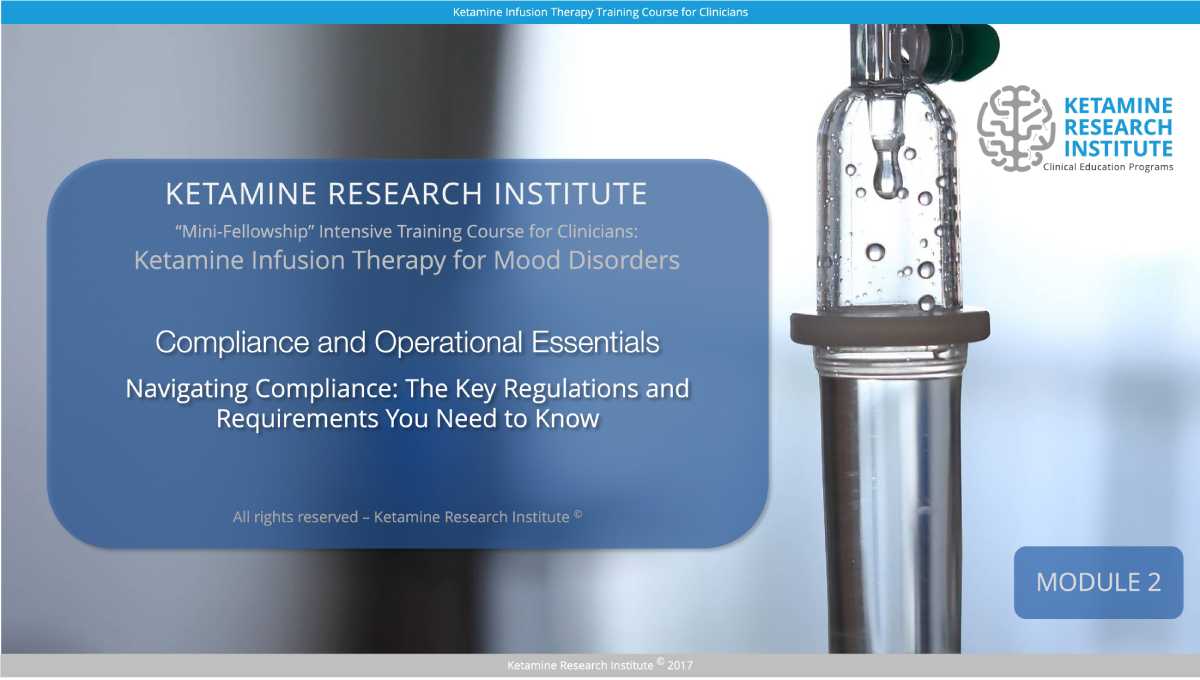
Module 2 – Compliance and Operational Essentials
Next, we delve into the regulatory landscape, helping clinicians navigate the complex rules set by APA, ASA, DEA, and state medical boards. This module covers everything from patient selection and documentation to the operational requirements needed to set up a compliant ketamine practice. Clinicians will learn how to choose the right candidates for therapy, manage essential documentation, and ensure their practice is fully equipped and compliant.
Inside Module 2:
Navigating Compliance: The Key Regulations and Requirements You Need to Know
Meet Your Watchdogs: The Authorities Overseeing Ketamine Practice
• Key Regulatory Bodies: Who Governs Your Practice?
• Navigating APA, ASA, DEA, and State Medical Boards
Identifying Ideal Candidates: Who Benefits from Ketamine Therapy?
• Patient Selection 101: How to Evaluate and Screen for Ketamine Therapy
• Evaluating Candidacy: Labs, Records, and Referrals for Ketamine Therapy
• Navigating Patient Selection: Cautions, Contraindications, and Best Practices
From Screening to Discharge: The Complete Ketamine Documentation Toolkit
• Essential Documentation Forms and Metrics for Ketamine Therapy
• Essential Documentation Guide: Metrics, Notes, and Legal Requirements
• The Critical Forms for Ketamine Therapy – DEA Requirements
Setting Up for Success: Space, Personnel, and Equipment Essentials
• Operational Essentials: What You Need to Run a Ketamine Practice
• Supply Chain and Vendor Management: Ensuring Smooth Operations
• Equipping Your Practice: Key Operational Requirements for Ketamine Therapy
• Get Your Questions Answered: Everything You Need to Know and What It Will Cost
Why This Course Stands Out
Our training offers unmatched depth and practical guidance, combining crucial theoretical knowledge with real-world application. Clinicians will leave Day 1 with a solid foundation in both the science and the regulatory aspects of ketamine therapy, ready to integrate this powerful treatment into their practice with confidence and compliance.
Clinical Session 1 - Preparing the Ketamine Infusion Room
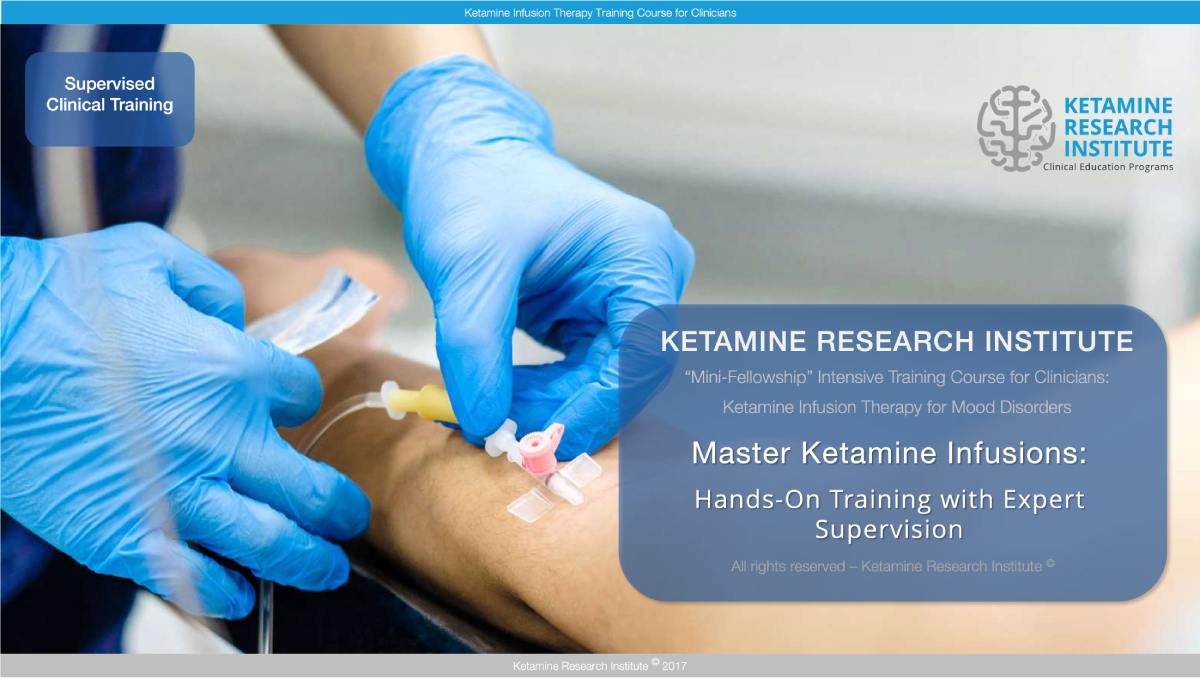
Clinical Module 1: Mastering the Essentials of the Infusion Room, Equipment, and Patient Interaction
Achieving clinical success in ketamine therapy starts with mastering the infusion process, and this module provides the comprehensive foundation needed to excel. From the precise setup of the infusion suite to expertly managing IV lines, every detail is meticulously covered to ensure that you deliver safe, effective, and patient-centered care.
Understanding the intricacies of the physical space, patient monitoring, and the use of advanced equipment like infusion pumps is crucial for tailoring treatments to each patient's unique needs. This training goes beyond the basics, focusing on mastering vascular access techniques and adhering to stringent safety protocols, essential for preventing complications and ensuring successful outcomes.
With a strong emphasis on real-world application, this module is essential for clinicians committed to achieving the highest standards in ketamine therapy and providing superior care that truly impacts patients' lives.
Inside Clinical Module 1:
The Clinical Encounter: Your Step-by-Step Guide to a Successful Ketamine Infusion Session
• Detailed guidance from patient entry to discharge, ensuring a seamless therapeutic experience.
• Techniques for setting the right tone, managing patient expectations, and creating a therapeutic environment.
Optimizing the Ketamine Infusion Suite
• Create a space that maximizes safety, efficiency, and patient comfort.
• Use lighting, sound, and comfort measures to enhance the therapeutic environment.
Patient Preparation and Monitoring: Ensuring Safety and Success
• Best practices for preparing patients mentally and physically for infusion.
• Continuous, real-time monitoring of vital signs and mental status throughout the session.
Equipping for Excellence: Tools and Technology for Superior Care
• A comprehensive checklist of essential tools and supplies for your infusion suite.
• Integration of advanced technology, such as electronic infusion records, for enhanced patient care.
IV Access Mastery: Techniques for Safe and Effective Vascular Access
• Complete instructions on obtaining IV access, including expert tips for IV insertion and securing lines.
• Mastery of vascular access techniques and devices to become proficient in peripheral line placement.
Infusion/Syringe Pumps: Precision in Practice
• In-depth training on the operation and maintenance of infusion and syringe pumps.
• Tailoring infusions to individual patient needs for precise dosing and optimal outcomes.
Ensuring Safety from Start to Finish: Transport and Discharge Protocols
• Implementation of critical safety protocols for all stages of treatment.
• Strategies for managing and mitigating adverse reactions during infusion.
• Guidelines for safe patient transport and discharge, including post-infusion monitoring and education.
Your Keys to Safe and Effective Ketamine Therapy
Mastering these essential aspects of ketamine infusion therapy is about acquiring knowledge and ensuring the highest standard of patient care and clinical success.
The detailed focus on optimizing the clinical environment, mastering IV access techniques, and adhering to stringent safety protocols is critical to preventing complications and achieving positive outcomes.
By integrating these practices into your daily routine, you'll be fully equipped to deliver safe, effective, and transformative ketamine therapy, setting you apart as a leader in the field.
Click here to go on to day 2 of training
Here is what our graduates have to say
Dr. Landauro:
I am an Austrian psychiatrist. One year ago, I started using ketamine for the treatment of my depressive patients without formal training using the standard protocol published in the literature. I decided to attend the Ketamine Institute’s training program to enhance my skills.The Ketamine infusion therapy for mood disorders” training course for physicians went above and beyond my expectations. Dr. Grass' brilliance and profound professional expertise made this course an unforgettable and truly eye-opening experience. I can now understand Ketamine from a pharmacological, anesthesiology, psychiatric, medico-legal and therapeutic perspective. I could put the contents I learned immediately into practice and my patients are already profiting from the knowledge I gained."
…thank you!"
—Dr. Med R Febres Landauro – Saltsburg, Austria

To Learn More About Our Programs - please click the links below:
The "Mini-Fellowship" Intensive Training Program
A Detailed Course Overview
Day 1: Essential Foundations for Ketamine Therapy
Day 2: Mastering the Future of Ketamine Therapy
Day 3: Personalization and Precision in Ketamine Therapy
Our Course Schedule and How To Apply For Training
The Origin of Our Ketamine Training Program
What Our Graduates Say About The Course
How the Ketamine Research Training Program Complies with APA and ASA Recommendations
"Mini-Fellowship" Intensive Ketamine Infusion Training for Clinicians
3-Day Intensive Course
Our course not only covers all of the practical aspects of ketamine therapy but expands into scientific principles allowing optimization of the basic protocol. All course training is conducted “on-site” in an actual infusion center so that you will have an opportunity to become familiar with the environment in which infusions are performed and obtain valuable clinical experience administering ketamine infusions under expert supervision. This includes utilizing all of the necessary monitoring equipment, intravenous delivery systems, and supplies necessary for the safe administration, storage, and handling of ketamine.
How to effectively integrate ketamine therapy into your current practice
_________________
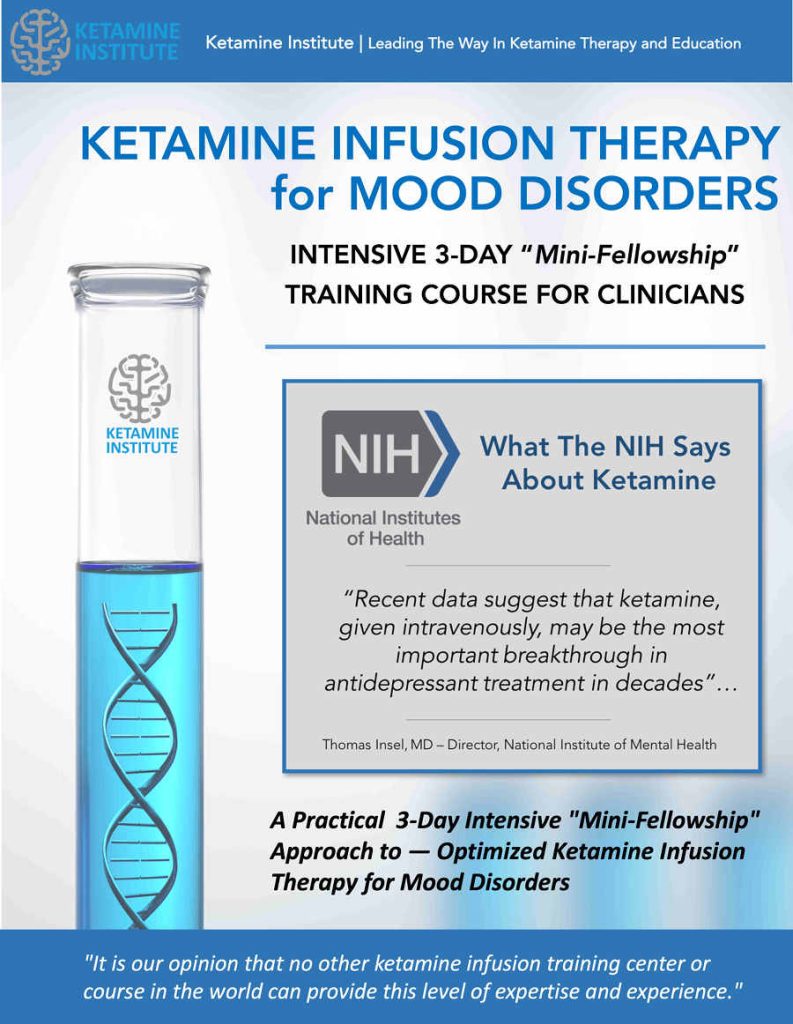

The Ketamine Institute
The Ketamine Institute is leading the way in the field of ketamine infusion therapy and physician education with our new ketamine infusion training program. We’re on a mission to accelerate the health care revolution. We have pioneered ketamine infusion therapy to bring the latest breakthrough discoveries about ketamine out of the research lab and into our infusion centers.
